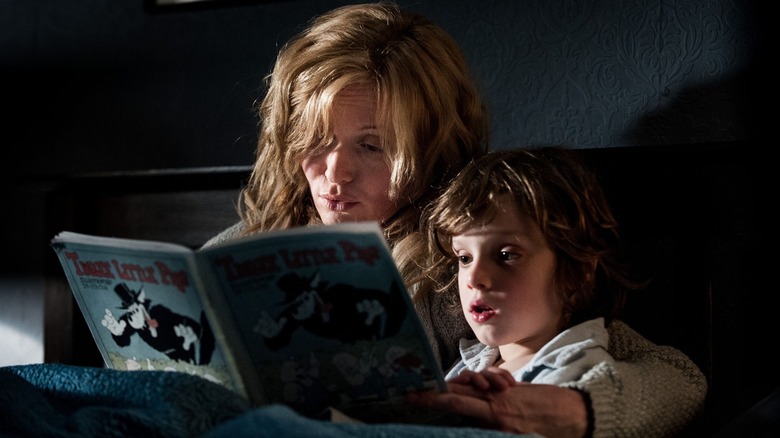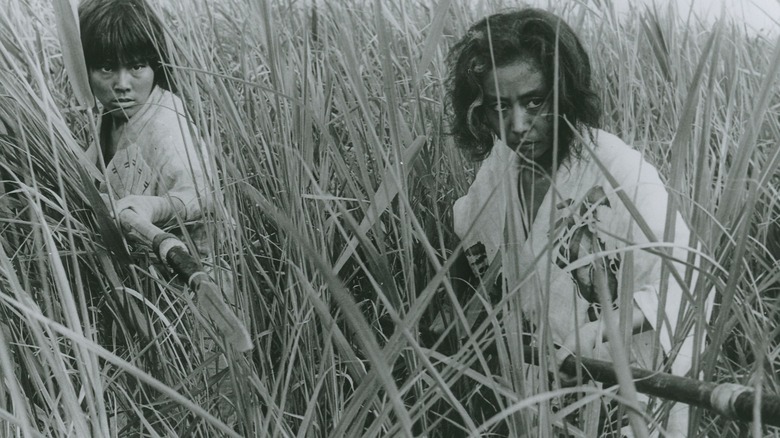The Horror Movies That Terrified The Exorcist Director William Friedkin
Two years before director William Friedkin made a splash with "The Exorcist," he made an unforgettable neo-noir thriller. 1971's "The French Connection" has a grimy, immediate feel to it, and while it is full of thrills, the portrayal of its core themes feels jarringly honest. Friedkin captures the bureaucratic nature of crime-fighting, which often goes hand in hand with the most despicable form of prejudice that extends to every strata of society. Each of these deep-rooted sentiments is woven with boundary-pushing frenetic intensity, culminating in one of the most tense, exhilarating chase sequences ever put to film. This natural knack for astonishing craftsmanship paid off in all the right ways in his next film "The Exorcist," which is still considered the standard for overt, visceral horror in the demonic possession genre.
Friedkin's brand of horror in "The Exorcist" is more complex than what is promised by the film's mainstream reputation. Yes, the 1973 film is meant to scare and shock by etching an uncomfortable, exaggerated portrait of demonic possession, but it is also so much more. Friedkin presents us with Regan's (Linda Blair) interior tussles even before she starts levitating or spinning her head all the way around.
Regan is a shy, lonely kid who seeks refuge in art to make the best out of her situation, with not many friends to confide in. As her once-bright eyes start to look murky and she begins to feel scared and confused, the true meaning of fear is revealed to us. The helpless dread that her mother Chris (Ellen Burstyn) experiences as she sees her daughter suffer is the stuff of nightmares, as no parent can ever be prepared to protect their children from such unimaginable evil. But Chris perseveres, doing everything she can, even when all hope is lost. Friedkin taps into this unconscious fear of being unable to help a loved one as they spiral, transform, and ultimately become unrecognizable.
Given Friedkin's deep understanding of horror (and its many shades), which films from the genre managed to scare him? Let's take a look.
Friedkin has a fondness for horror films with a grounded premise
In an interview with Vice, Friedkin talked about the reason why he returned to horror throughout his career, highlighting the genre's capacity to accommodate "high-intensity films about characters that have their backs against a wall and no place to go." This led to a conversation about the films that did terrify him:
"The films that have terrified me are 'Alien', 'Psycho', a Japanese film called 'Onibaba' (1964) — one of the most terrifying films I've ever seen. And I loved this recent film 'The Babadook.' It took me by surprise, and I believed it. I mean, it was largely about the difficulty of being a single mother with a troubled child. In other words, a realistic situation, with real characters, that I found to be profoundly moving."
While "Psycho" and Alien" are classic horror offerings that evoke completely different kinds of terror, "Onibaba" utilizes a medieval setting to underline every excess humanity is capable of, framed through a lens that is both chilling and breathtaking. Friedkin's sensibilities can be better understood through this latter choice, as "Onibaba" is a bit of an acquired taste even for the most avid horror fans, its bottomless eeriness being a tad too strong. That said, the film's horror is more pragmatic than fantastical, just like "The Babadook," which conjures something outlandish by rooting it in the experience of a realistic scenario. When the authentic and the surreal are mixed stunning horror titles are often made, much like Friedkin's own "Exorcist," which thrives due to this duality.
The absence of authenticity can ruin even the most well-intentioned horror films, such as "The Guardian," which Friedkin helmed in 1990. Although brimming with potential, the film is a dud, lacking the punch of his celebrated 1973 horror title. Moreover, the story completely leans into "Evil Dead"-coded splatstick horror but lacks the ingenuity (and guts) to pull it off. However, Friedkin returned to his love for realism-based horror in his 2006 psychological horror "Bug," which is as disturbing, intense, and claustrophobic as one would expect from the one who made "The Exorcist".

